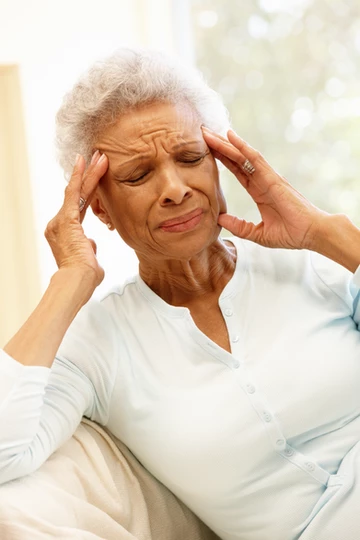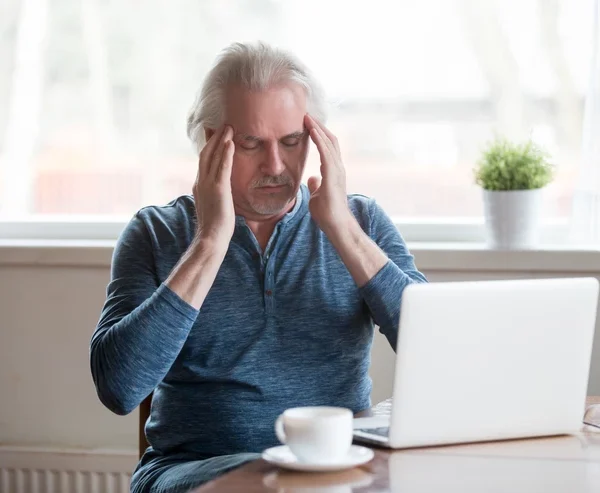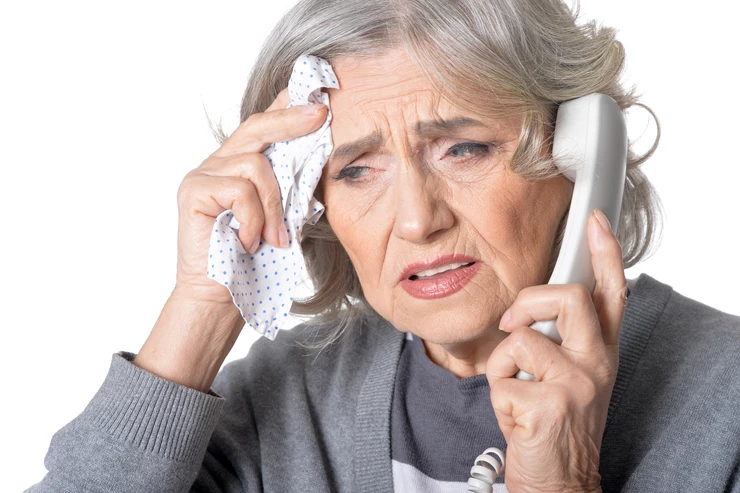Headache and Migraine Triggers in Older Adults (Some Remedies)
Headache and sometimes migraines are common among seniors. Fortunately, migraines seem to be less severe as someone gets older. Even though seniors frequently report headaches, migraine prevalence is less likely for those over the age of 65, except for those diagnosed with a headache or migraine disorder younger in their lives.
While migraines seem to lessen later in life, there are still many types of diagnosable headache disorders. Some older adults may experience aura without headache, a subtype of migraine disorder that comes with sensory and visual disturbances.
Studies have revealed that there is also a tendency to overuse medications, causing a secondary problem that studies have shown affects ⅓ of older adult patients who have migraines. There are also tension headaches and chronic headaches that commonly affect the elderly. Hypnic headaches wake you up in the middle of the night, at specific times. Hypnic headaches carry a dull pain for about an hour but are not as strong as migraines.
Light Sensitivity Among Seniors
Light sensitivity is a common theme for headache sufferers at any age. But, it is still a prominent issue for the elderly who suffer from headaches. Some seniors have reported that flashing lights, fluorescent lights, glare, and bright lights cause headaches. Photophobia can be expected for those older adults who experience headaches in general.
Migraine Symptoms in the Elderly

While common symptoms happen at any age, some are specific to the elderly population.
- Paleness
- Dry mouth
- Anorexia
- ‘Pins and needles sensation in the hands or face
- Runny nose or teary eyes
- Speech disturbances
- Seeing zigzag lines and other visual disturbances
- Light and sound sensitivity
- Nausea
- Dizziness
- Last up to 60 minutes
Recognize Emergency symptoms
Seek emergency assistance immediately if you have:
- A very sudden and severe headache
- Headache after a fall or head injury
- Fever, rash, stiff neck, seizure, confusion, double vision, weakness, numbness, or difficulty speaking
- The pain grows in intensity despite treatment
These symptoms suggest a more severe condition, so you must get a prompt diagnosis and treatment.
Migraine Triggers in the Elderly
There is not much research that explicitly denotes migraine triggers in the elderly. However, neck pain, smoke, and alcohol intake have been reported. Beyond these, the usual triggers are:
- Anxiety and stress
- Fluorescent lights
- Glare and bright sunlight
- Acrid smells
- Loud sounds
- Sleep disruption
- Bright sunlight and glare
- Certain foods such as chocolate
- Overuse of medication

Impact of Migraines and Headaches on Elderly Patients
Most of the literature about the impact of migraines on individuals over the age of 65 revolve around comorbid conditions they are facing. Some research suggests those with diagnosed migraines may be at an increased risk for strokes and depression. No evidence was noted in regards to headaches and Alzheimer’s or dementia. However, if you have been diagnosed with another condition and have headaches, the headaches must be considered for treatment planning.
Over-the-counter (OTC) medications such as ibuprofen, acetaminophen (Tylenol,others), aspirin, naproxen (Aleve), and hydroxyzine (antihistamine) are commonly used oral medication therapies for older adults who have migraine or tension headaches. Make sure to check with your doctor before taking any medications, even OTCs.
Your doctor needs to determine any possible underlying causes accurately and quickly and offer treatments that take into account your medications and comorbidities that older patients may have. There are mixed studies on whether or not high blood pressure can cause headaches, but to be on the safe side, monitor your blood pressure after coming down with a headache.
Home Remedies for Headaches
- Rest up – get enough sleep every night and do your best not to over-exert yourself during the day.
- Stay hydrated – drink plenty of water and always carry a water bottle with you when you go out, especially in hot weather. Dehydration can cause headaches.
- Place a cold compress on your forehead to relieve tension and muscle stress.
- Massage (neck and head)
- Acupuncture or acupressure
- Drink a small cup of coffee. Caffeine itself can be a treatment for acute migraine attacksPractice relaxation techniques, such as meditation and yoga to help manage anxiety and stress linked to headaches.
- Use essential oils, such as peppermint oil and lavender oil, to relieve anxiety and stress due to their calming effects.
- Stretching and low-impact exercises aid the body in releasing endorphins which are your body’s natural pain-relievers.
Everyone gets headaches from time to time, and usually, that is not worrisome. Still, if you are getting headaches that are interrupting your activities of daily living, it is time to pay a visit to your doctor. Headaches aren’t always preventable, but your doctor can help you manage the symptoms.


